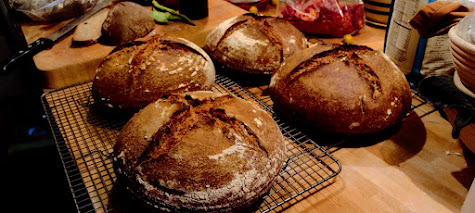Digression, Rant, Books
I have an enormous library- which I partially show above-together with a few family artifacts of interest only to myself and siblings. In the library is a pretty extensive collection of bee books, -though not part of this photo- all sorts- maybe a few hundred volumes collected over 30 years, some, quite expensive, though most picked up cheaply at used book stores.
Digressing for a paragraph: also in the picture are the Wilton rugs my mother left us - 1930s era British copies of ancient mid-Eastern rugs, always woven in three pieces and stitched together- myself and my sibliings spent our lives on these, and in the center, the rocker of my grandmother, who came to Seattle in the 1900s, and beyond that, the certificate to my great Uncle Aaron, who fought in both world wars, and in the first war, was wounded at Belleau Wood, in the 6th machine gun battlion (my brother has written a history of this), and whom used to take me fishing for salmon at 10 or 12 at Westport, and to the left of that, a chair from my Great Aunt Bud, who's father was a pioneer of Bellingham (New Whatcom then), and she was a photographer and a colorist of photos, and this was her chair when coloring photos in the 1920s, and at the right, a Craftsman rocker I bought from the hardware store here in town 30 years ago, from an old Duvall family , and in front, a wagon I am building based on a real wagon here in town I measured, complete to all details, and to the far left, a radiator that heats the house salvaged from the building they tore down to build the Seattle Opera house, which my friend Rex and I pulled out, one of many, at great effort (they weigh way more than I could handle now, and all of this on a floor of Doug Fir salvaged from the old Wallace Farm), and around these, a lifetime of book collecting, this image with mostly poetry and architecture and photography books, but a wide variety everywhere.
Back to the topic: I received a "survey" today from the state "pollinator coordinator". If you live here and register your bees, you likely did too. I'm skeptical of surveys- always written to justify the existence of the surveyor, or support their product- and this one seemed about the same. Questions about reviving a state apiarist, and about insecticide use, that sort of thing. Trying to drum up a state job, and trying to suggest the pesticides are the major issue we have to deal with as beekeepers. In the end, more regulation all around.
I'm a hobby beekeeper- I don't know how the big boys with 1000s of hive would see this, but I see only one problem, and it isn't even mentioned in the survey.
Mites.
Mites, mites, mites. No apiary inspector can help with this. If they could, they'd be on the cover of Time, or the ABJ. Its FAR more decimating then insecticides (which i doubt have anything but a random impact around here- if any). and are devastating. Will increasing temps make them worse? Of course they will! Longer brood time for one. More generations. There is no issue more important for beekeepers.
The minuscule laughable amount we have to pay for registering hives doesn't deal with this at all. It supports a "state pollinator" bureaucrat. God bless them for their intentions- but its truly a laughable position to be in when you're in a state that is exploding, destroying habitat geometrically, and yet suggesting that people can build "pollinator gardens" in their city plots to somehow offset the growth. Tough job!
But for beekeepers who keep honeymakers, A. mellifera, a non-native species, basically livestock, the main thing is the mite. Its our mad cow disease. It has a biology, and needs attention way beyond what Beltsville is doing.
Its contradictory. There are native pollinators. A bunch of people who have no roots here bring in honeybee that have no roots here, and now want to support the native pollinators and also support an imported bee that competes with the native bee, and likely is a source of disease for the natives. Its all jumbled up. Native bees are like native anything, endangered, always. We see it more and more- how rare it is that a native plant or animal isn't challenged by competition from invasives, or dying due to our disturbance of the land. Heck, most of us are invasives ourselves. The list is long. But the honeybee is basically a small cow with 6 legs and a stinger. We milk it. It needs our help. But its not the same at all as a native bee- it may in fact be a problem to them.



Comments
Post a Comment